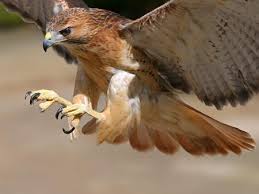Predators of Your Birds
Your birds are constantly at risk, especially in rural, heavily wooded areas. It seems that almost every predator wants a piece of your flock, and will get that piece if you don't use extreme caution with your fowl. Be it weasels, fishers, raccoons, or raptors, protecting your flock from predators is one of the most important jobs of any backyard poultry farmer.
Raptors (Predatory flying birds, not the dinosaur kind or the Toronto basketball team) are, in my opinion, the largest threat to the safety of your flock that you will ever have to face. They can quickly swoop in and kill your birds, and will easily just carry off young birds and small breeds of bird. Their quick attacks make them hard to protect against, and their flying abilities make them hard to shoot down or otherwise subdue them. One way to prevent raptor attacks is to string twine or fishing line above the areas your birds roam. Raptors, with their incredible vision, see the string and doesn't recognize the area as open, scaring them. "Backyard Chickens", a fowl-raising forum, recommends using owl figurines to deter prospective raptors. Another strategy offered by the site is to crumple up tin foil and spread it around the raptors' hunting grounds; it is said that the glare makes them wary and less willing to attack your flock.


Another menace to your prized poultry are predatory mammals, like weasels and fishers. While they may look adorable, like skinny cats or the such, they are savage beasts. Many of my personal Black Runner Ducklings have been torn apart by these vicious killers as well as other young birds. These predators are mainly nocturnal, attacking your birds when they are the most vulnerable: in their sleep. This makes them especially dangerous, as sleeping chickens, ducks and geese are not very conscious of their surroundings. One way to deter these animals is to make their night lodgings more impenetrable to assault. Secure doors, windows, or any other points of entry. make sure there are no holes either, including vents or other air access holes. "If a hot dog can fit, a weasel can fit" says blogger MadChickensVT on the forum 'Backyard Chickens". Weasels are a very flexible animal, and can fit through holes far smaller than one would assume they could pass. Weasels are not strong enough to take down anything larger than a midsize chicken, so owners of only large birds do not have to worry as much about them. Fishers, while not as infiltrative as their weasel contemporaries, are still a danger to your flock. A fisher can easily take down a fully grown goose, one of the only animals able to do so. Lock up your birds at night, and fishers will be no problem. Coyotes will attack your birdsbut very rarely. These animals won't normally approach human populations, so you will most likely never have to worry about them.


Another menace to your prized poultry are predatory mammals, like weasels and fishers. While they may look adorable, like skinny cats or the such, they are savage beasts. Many of my personal Black Runner Ducklings have been torn apart by these vicious killers as well as other young birds. These predators are mainly nocturnal, attacking your birds when they are the most vulnerable: in their sleep. This makes them especially dangerous, as sleeping chickens, ducks and geese are not very conscious of their surroundings. One way to deter these animals is to make their night lodgings more impenetrable to assault. Secure doors, windows, or any other points of entry. make sure there are no holes either, including vents or other air access holes. "If a hot dog can fit, a weasel can fit" says blogger MadChickensVT on the forum 'Backyard Chickens". Weasels are a very flexible animal, and can fit through holes far smaller than one would assume they could pass. Weasels are not strong enough to take down anything larger than a midsize chicken, so owners of only large birds do not have to worry as much about them. Fishers, while not as infiltrative as their weasel contemporaries, are still a danger to your flock. A fisher can easily take down a fully grown goose, one of the only animals able to do so. Lock up your birds at night, and fishers will be no problem. Coyotes will attack your birdsbut very rarely. These animals won't normally approach human populations, so you will most likely never have to worry about them.


